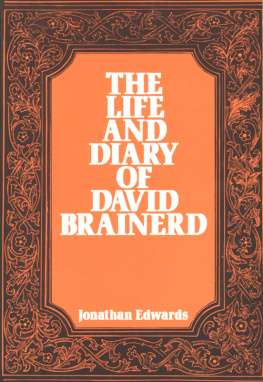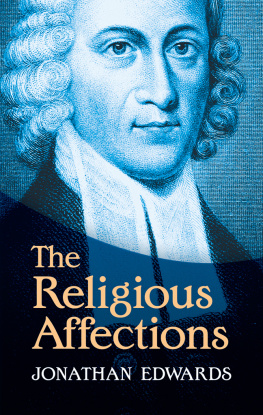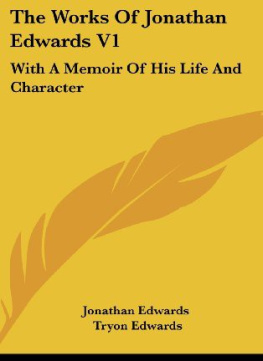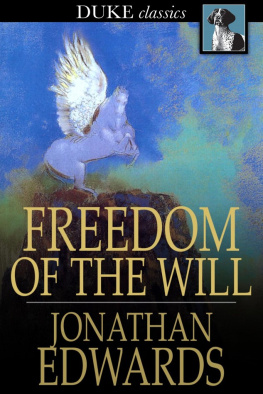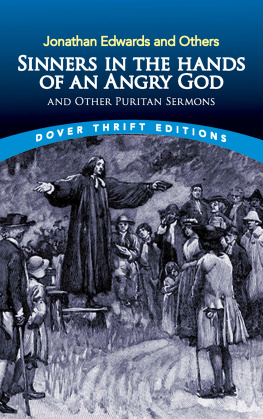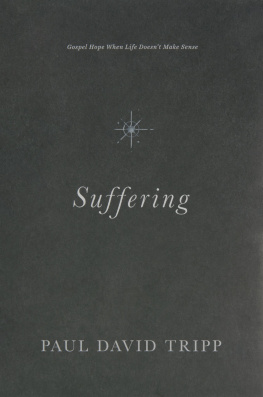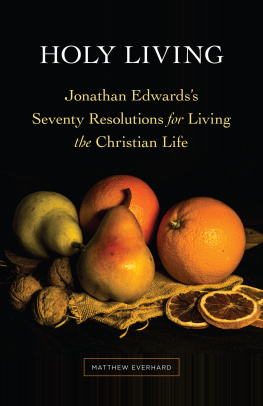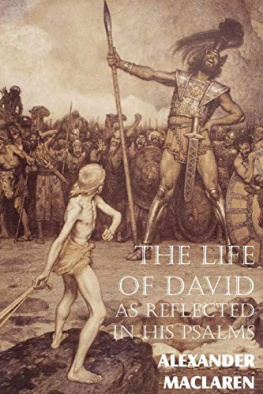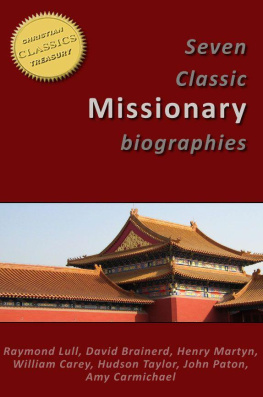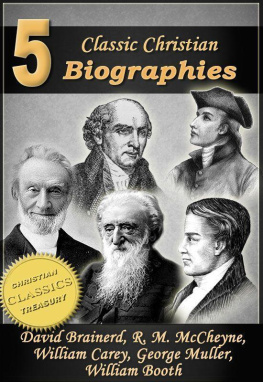
1949 by
THE MOODY BIBLE INSTITUTE
OF CHICAGO
1980 Edition
All rights reserved. No part of this book may be reproduced in any form without permission in writing from the publisher, except in the case of brief quotations embodied in critical articles or reviews.
ISBN: 978-0-8024-9275-3
We hope you enjoy this book from Moody Publishers. Our goal is to provide high-quality, thought-provoking books and products that connect truth to your real needs and challenges. For more information on other books and products written and produced from a biblical perspective, go to www.moodypublishers.com or write to:
Moody Publishers
820 N. LaSalle Boulevard
Chicago, IL 60610
T HE FOLLOWING ACCOUNT of David Brainerds life and work among the American Indians has been taken from Volume III of The Works of President Edwards, in Eight Volumes (James Black & Son, London, 1817). The section covering the period from April 20, 1718, through May 7, 1745, is quoted from The Life and Diary of the Reverend David Brainerd (pp. 81224, Edwards, Vol. III). It has been thought well to take the next large section from Brainerds Journal,kept by order of the Honorable Society (in Scotland) for Propagating Christian Knowledge, which directed and supported Brainerds work among the Indians (pp. 319411, Edwards, Vol. III). The same period is also covered in Brainerds Life and Diary (pp. 225256, Edwards, Vol. III), but the record has in this case been taken from the Journal rather than the Diary, as it is more extensive, not so subjective, and probably gives a more complete picture of the conditions of the Indians and the effect of the gospel among them.
The record of the last fifteen months of David Brainerds life, from June 29, 1746, to October 9, 1747, is again taken from the Life and Diary (pp. 257311, Edwards, Vol. III).
Brief portions of the Life and Diary and Journal have been omitted here and there for brevitys sake. In many cases these included summaries of Brainerds activities during the days which either he or Edwards omitted from the record. There is additional material in Edwards original volume (Volume III of his Works) which are not included here, such as Brainerds General Remarks on the Doctrines Preached to the Indians; his Method of Learning the Indian Language, and of Instructing the Indians; A Short Account of Missions; several of Brainerds letters to his friends, and the sermon of the Rev. E. Pemberton, M.A., pastor of a Presbyterian Church in New York City, preached June 12, 1744, at Brainerds ordination as a missionary to the Indians; and Edwards Reflections and Observations on Brainerds Memoirs. But these are not properly parts of the Diary and Journal.
Some changes have been made in the original punctuation and spelling. Brainerds writing is full of Scripture, and he would often place within quotation marks phrases or sentences that followed the text very closely, but which may not have been direct and exact quotations. This punctuation has not been changed, nor has an attempt been made to conform all of these passages to the exact words of the King James Version in the present volume.
Since President Edwards knew Brainerd personally, and carefully edited the young missionarys Diary and Journal himself, it is believed that, apart from the few omissions and additional material mentioned above, this volume now makes available again a fairly complete record of the self-denying life and strenuous labors of David Brainerd as he preached the gospel to the American Indians.
PHILIP E. HOWARD, JR.
OCTOBER, 1948
CONTENTS
Part I
From His Birth to the Time When He Began to Study for the Ministry, 17181742
Part II
From About the Time That He First Began to Study Divinity Till He Was Examined and Licensed to Preach, AprilJuly, 1742
Part III
From the Time of His Being Licensed to Preach Till He Was Appointed as Missionary to the Indians, JulyNovember, 1742
Part IV
From the Time of His Examination and Appointment to His Entrance Among the Indians at Kaunaumeek, 17421743
Part V
From His Beginning to Instruct the Indians at Kaunaumeek to His Ordination, 17431744
Part VI
From His Ordination Till He First Began to Preach to the Indians at Crossweeksung, Among Whom He Had His Most Remarkable Success, 17441745
Part I
From June 19 to November 4, 1745, at Crossweeksung and the Forks of Delaware
Part II
From November 24, 1745 to June 19, 1746 at Crossweeksung and Forks of Delaware
Part VII
From the Close of His Journal to His Return from the Susquehannah, JuneSeptember, 1746
Part VIII
After His Return from His Last Journey to Susquehannah Until His Death, 17461747
I T WAS AN UNUSUAL and divinely ordained combination of extraordinary intellectual power and utterly selfless devotion that gave to the world a little over two hundred years ago The Life and Diary of the Reverend David Brainerd. For Jonathan Edwards, who edited this moving narrative, was looked upon throughout the English-speaking world as one of the greatest philosophers since the days of the apostle Paul and Augustine; while the personal records of the strenuous labors of the young missionary to the Indians has been an inspiration to hundreds, perhaps thousands of other Christian workers ever since his day. It seems fitting, therefore, that in the same volume which makes available a new edition of the Journal there should be some record of the life and work of its brilliant editor.
JONATHAN EDWARDS was born at East Windsor, Connecticut, on October 5, 1703. His parents were the Rev. Timothy Edwards, for sixty-four years pastor of the Congregational Church of East Windsor; and Esther Stoddard, daughter of the Rev. Solomon Stoddard, who was for more than fifty years pastor of the church of Northampton, Massachusetts. Jonathan was the only son in a family of eleven children. As great credit is always due the mother of any large and well-trained family, it is interesting to have a glimpse of the talented Mrs. Edwards. Dr. Samuel Miller, Professor of Ecclesiastical History and Church Government in Princeton Theological Seminary, in 1856 wrote: The character of Esther Stoddard was no less eminent than that of her husband. She is represented, by tradition, as a woman of distinguished strength of mind, of superior education, peculiarly-fond of reading, and of ardent piety; and, of course, as well adapted to adorn and to bless the large domestic circle committed to her care.
Timothy Edwards was well known as a Latin, Greek, and Hebrew scholar, and he and his capable wife gave their ten daughters and one son their early education at home. Jonathan began the study of Latin at six years of age. He was early taught, by his excellent father, to use the pen abundantly, says Dr. Miller; to study with it habitually in his hand; to make a record of his doubts, his difficulties, and his comments on every subject, and to bring all his knowledge to the test of expressing it on paper for himself. In a word, it seems to have been a leading principle of his father, in regard to his son, and indeed all his children, to encourage them, from their tenderest years, to engage frequently in letter-writing, and every other kind of composition, as one of the best means of intellectual discipline. That this early habit exerted much influence on his subsequent studies and investigations, and contributed, in no small degree, to give a character to his after-life, cannot be doubted. When he was ten years old he wrote a reply to a fellow student, who held that the soul is material, which was marked by humor and sarcasm and showed an unusual depth of thought. At twelve he wrote an essay on the Wood Spider, with many detailed notes and observations concerning its habits.

